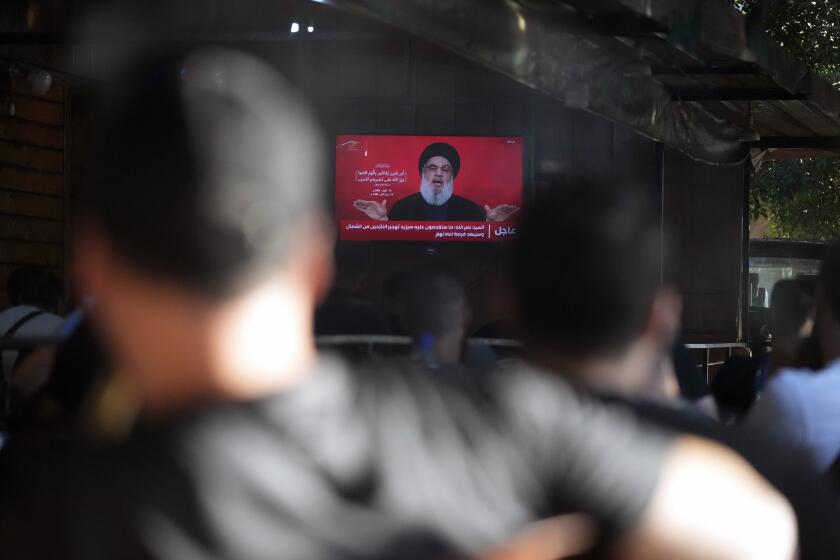Iraq, Terror Votes Come at a Good Time for GOP
War and terrorism will take center stage in Congress next week, as both chambers vote on an emergency military spending bill and the House devotes a day to debating a resolution on Iraq and the “war on terror.”
House Republican leaders say the decision to focus on Iraq and terrorism was made long ago. But GOP officials concede that the killing of Iraqi insurgent leader Abu Musab Zarqawi by a U.S. airstrike this week would make it easier for the Republicans to defend Bush administration policies.
“It certainly helps the atmosphere of the debate,” said Ron Bonjean, spokesman for House Speaker J. Dennis Hastert (R-Ill.). “It shows that we are fighting and winning the war on terror, and the resolution will reflect that.”
The measure is expected to assert that operations in Iraq are part of a global “war on terror” and to express “resolve” to complete the mission.
House Democratic leaders are awaiting the resolution’s final wording before announcing their position on it.
“We haven’t seen it yet,” said Jennifer Crider, spokeswoman for Minority Leader Nancy Pelosi (D-San Francisco). “I would hope the Republicans did not try to play politics with something this serious.”
In November, House members engaged in a heated hours-long debate after Republicans brought to the floor a resolution calling for an immediate withdrawal of troops from Iraq. The Republicans said it was important for lawmakers to go on record opposing that idea after Rep. John P. Murtha (D-Pa.), a retired Marine colonel and decorated Vietnam veteran, had argued that the U.S. presence in Iraq had become counterproductive and that American troops should start pulling out.
Democrats angrily denounced the measure as a purposely divisive political stunt that misrepresented Murtha’s point. After the two sides traded insults, the measure was defeated 403 to 3.
Debate on the new resolution pushed by the GOP is expected Thursday, after a vote next week on a compromise version of a $94.5-billion emergency spending bill.
Of the total, $70.4 billion will pay for operations in Iraq and Afghanistan, with the rest devoted to hurricane relief and pandemic flu preparations.
At the same time, the Senate will begin debate on a $517.7-billion funding bill for the Department of Defense.
Both measures provide Republicans and Democrats with ample opportunity to make their cases on the war in Iraq. Sen. John F. Kerry (D-Mass.) has said he plans to offer an amendment to the Senate bill requiring the withdrawal of U.S. troops by the end of this year.
Polls taken before Zarqawi’s death showed that Americans were deeply dissatisfied with what they perceived as a lack of progress in Iraq -- prompting questions about why Republican leaders would raise the subject. In a recent ABC News poll, 62% of respondents said the war in Iraq was “not worth fighting.”
But Norman J. Ornstein of the conservative American Enterprise Institute think tank, who studies White House and congressional relations, said spotlighting Iraq fit Bush political advisor Karl Rove’s strategy that “the best defense is a good offense.”
“That’s Karl’s playbook all the way: Turn weakness into strength,” Ornstein said. “Republicans still believe that no matter how much people are unhappy with what happens in Iraq, that when the crunch time comes with voters ... the Democrat Party can be portrayed as a weak party.”
Ornstein added: “The fact is that whether they talk about Iraq or not, they are saddled with it. So it’s better to go on the offensive.”
Although Republicans have a simple “stay the course” message, Democrats have struggled with a two-part formulation: support for the troops and for anti-terrorism efforts, but criticism of the Bush administration’s handling of the Iraq war.
Kevin Madden, spokesman for House Majority Leader John A. Boehner (R-Ohio), said the Democrats’ arguments usually lost ground with the public when they were aired.
“This is a contrast that is important for the American people to see -- that we have shown resolve even when faced with challenges,” Madden said.
“The Democrats don’t have a coherent strategy for what they would do, and when faced with those very same challenges, the only specific policy they have advocated is withdrawal or retreat and defeat.”
More to Read
Sign up for Essential California
The most important California stories and recommendations in your inbox every morning.
You may occasionally receive promotional content from the Los Angeles Times.










